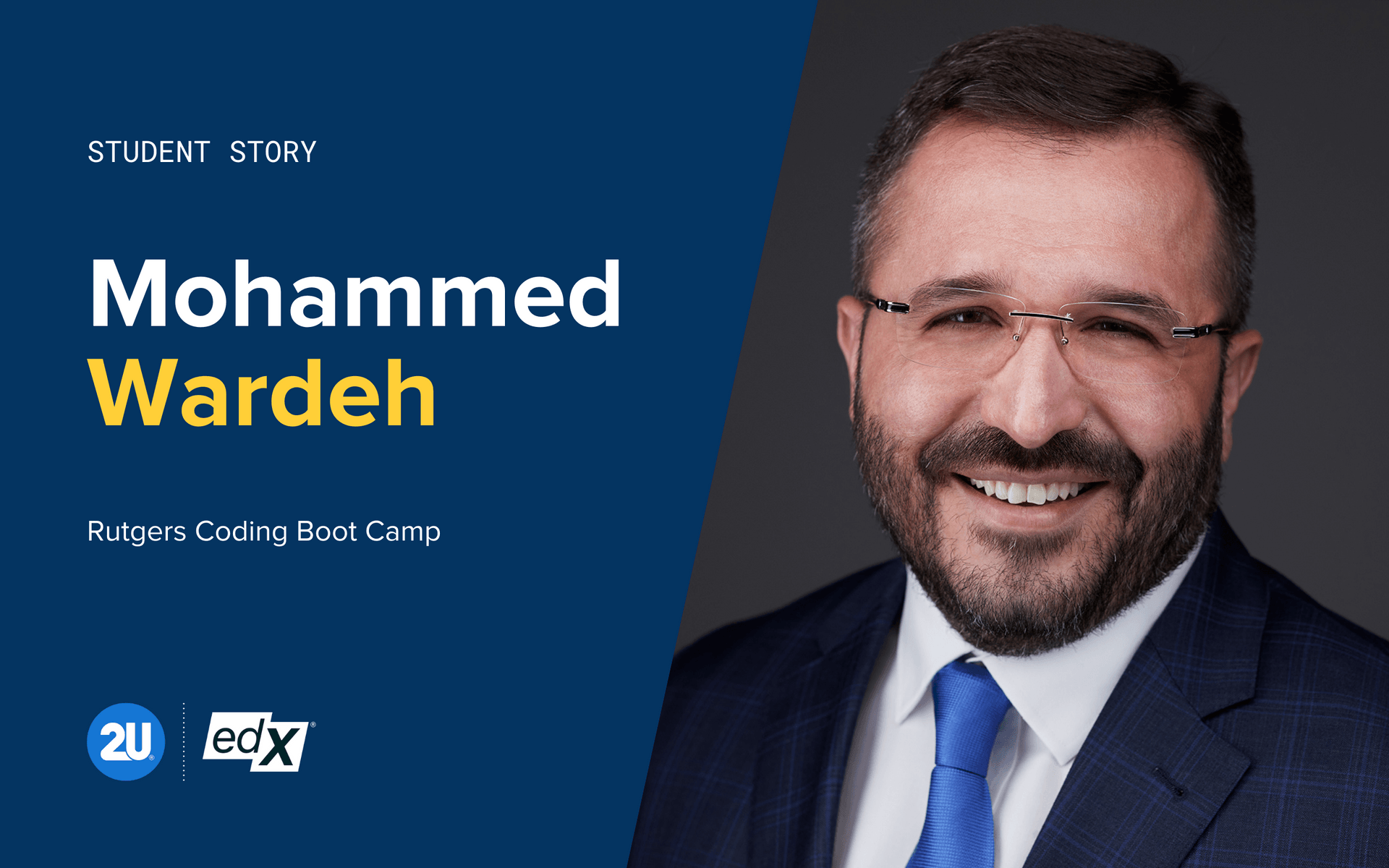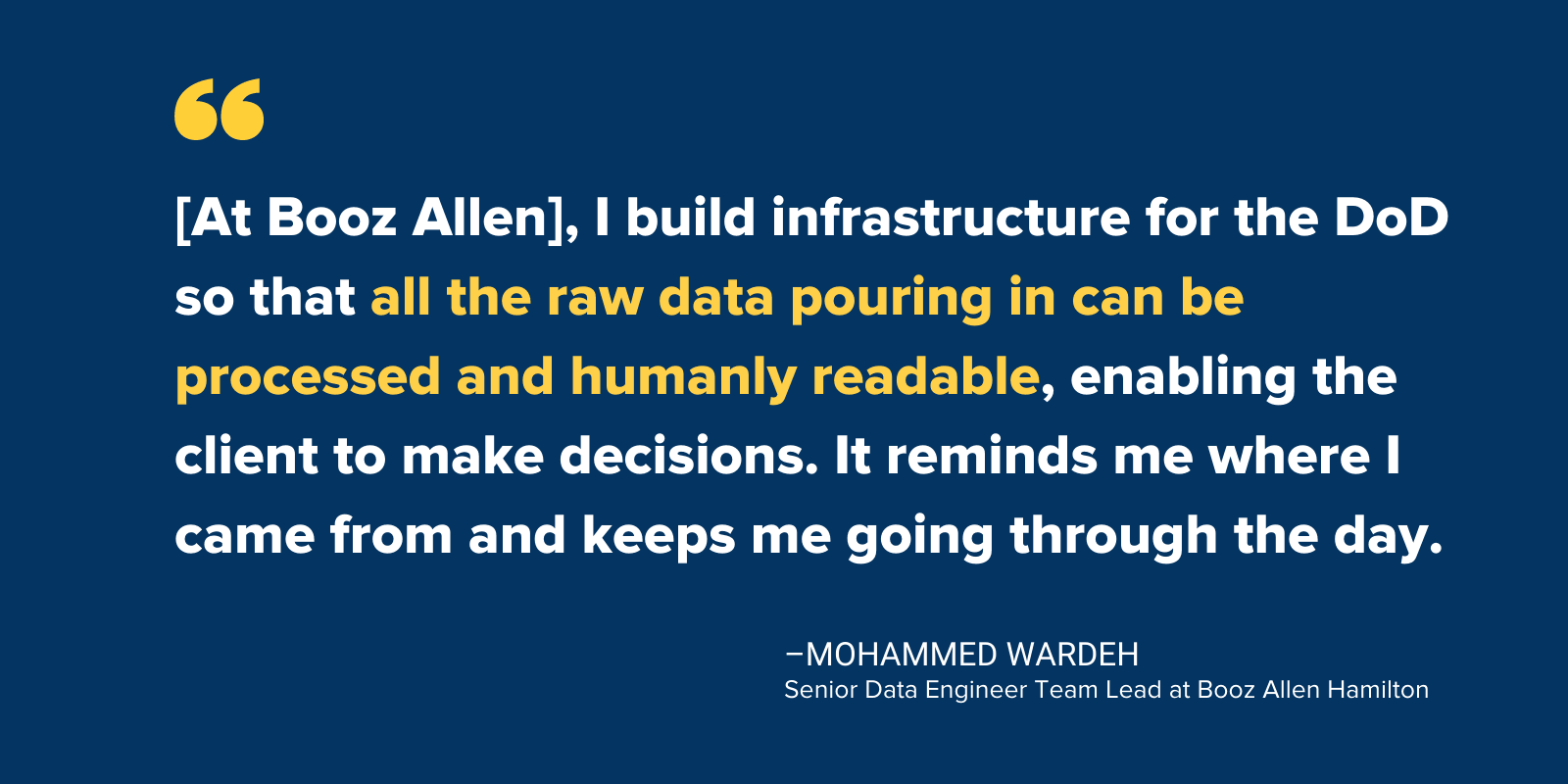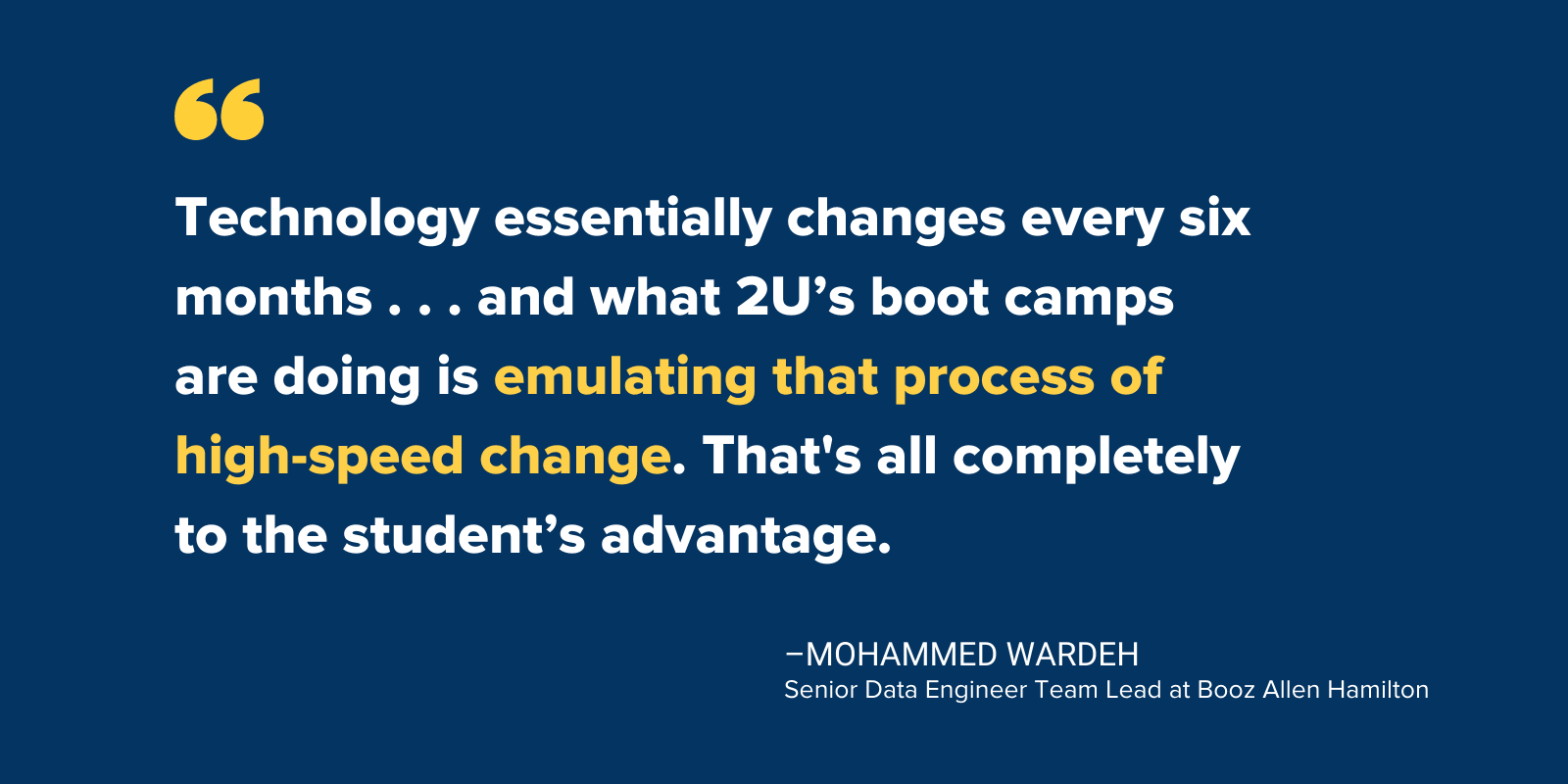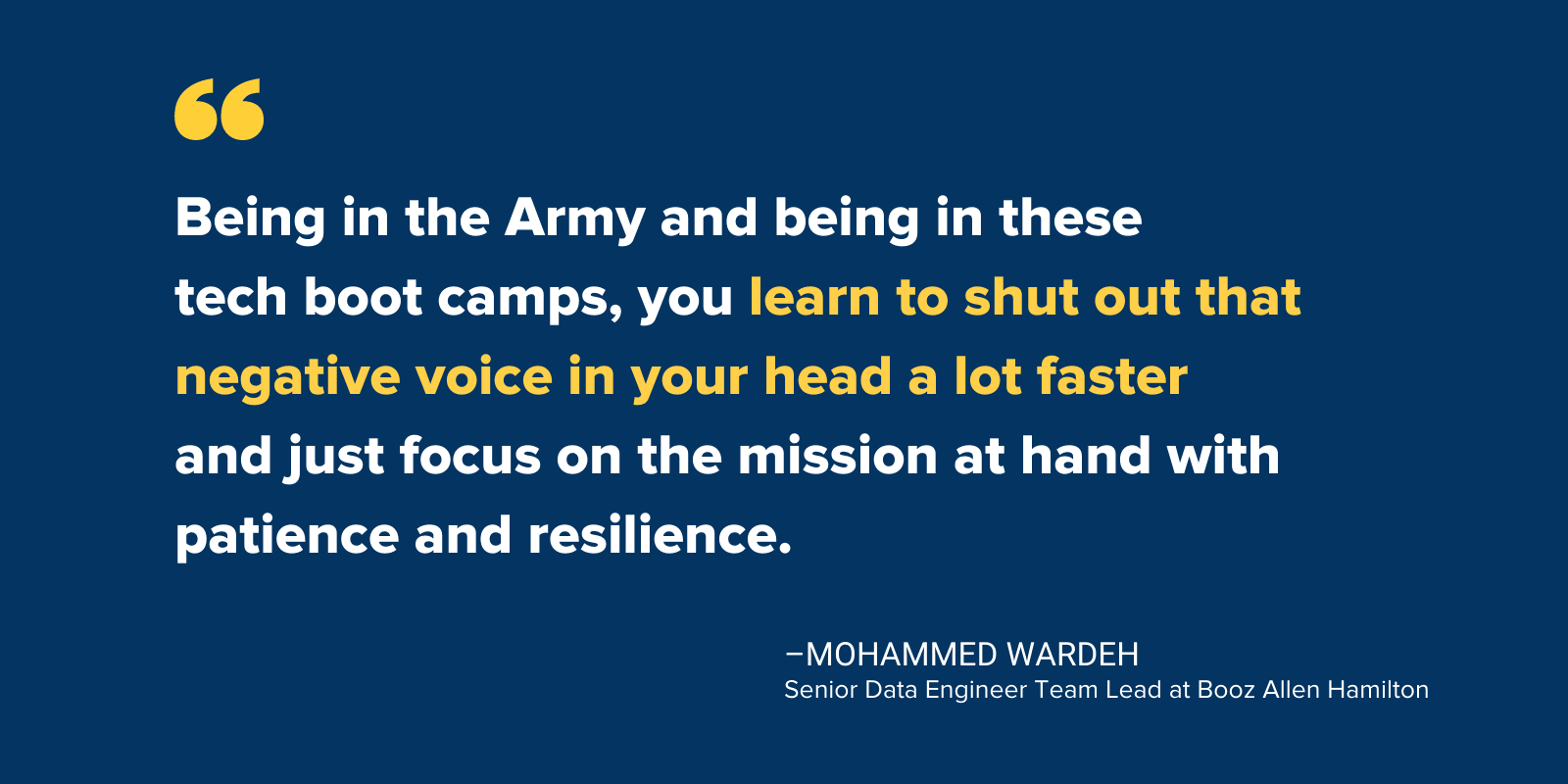Partner Spotlight
This Active-Duty Boot Camp Graduate Is Now a Lead Coding Instructor—and Senior Data Engineer at Booz Allen Hamilton
Written by Jedrek Woodarek on May 31, 2022
Related content: Boot Camps, Learner Stories, Impact and Outcomes

In January 2020, we interviewed Mohammed Wardeh, who, after securing his U.S. green card and joining the Army National Guard, had enrolled in the Rutgers Coding Boot Camp in order to expand his career options and provide a better life for his family. At that time, only a couple of months before the start of the pandemic, he had become a lead instructor for the same boot camp and was just beginning a software engineering role at 2U.
But like all the dedicated lifelong learners who graduate from 2U-powered programs, Mohammed’s story didn’t stop there. Two and a half years later, his career has continued to evolve: He’s not only about to start teaching the University of New Hampshire (UNH) Coding Boot Camp, but also he and his family relocated to the Washington, D.C., area so that he could take on a senior role as a data engineer team lead for Booz Allen Hamilton.
We recently caught up with Mohammed to hear how his tech and teaching journey keeps unfolding in exciting new ways, how his boot camp experience has had a long-term impact on him both personally and professionally, and how his passion for coding and data remains a driving force for delivering his best every day.

Mohammed, it’s so great to reconnect after all this time! The world has certainly changed since we first talked, hasn’t it? Tell us where life has taken you and your family since the start of 2020.
Well, it’s definitely been a whirlwind and not anything anyone expected, right? For me, I continued to teach with Rutgers and work at 2U for over a year after COVID hit, but after nearly a decade of living in New York, the entire family was itching for a change of scenery. The project I was working on at 2U hit a sustainable level, and I’m always on the hunt for new challenges. So I went to work as a software engineering manager for The Philadelphia Inquirer. But only a few months into the Philly job, a recruiter from Booz Allen reached out asking if I’d interview for a senior position with them. I was happy at the Inquirer, but Booz Allen made an offer I couldn’t refuse. So last summer, the family packed up again and headed down to Northern Virginia. While all of these career changes were happening, I never closed the door on 2U. Now that things are finally calming down, I’m excited to start teaching a coding boot camp again, this time with UNH beginning in July.
Wow, that’s definitely a lot of change! But we’re glad you’re finally feeling settled and getting back to the front of the virtual classroom. Through all you’ve been juggling, what’s kept you focused and motivated to keep learning and teaching coding?
I have a Master’s in Computer Information Systems, so data has been a part of my DNA for over 20 years. Up until taking the Rutgers Coding Boot Camp back in 2017, I had primarily worked on back-end systems for the B2B world. Wanting to learn more about front-end systems and all the brand-new technologies around that was the main reason I signed up.
For me, data is not just two-dimensional tables. Data is like the soul of our bodies—it’s what makes everything function and helps us make smart decisions. That’s what continues to intrigue me about the work I do: how to take raw data and make it humanly understandable and readable with some kind of infrastructure so that it all makes sense. There are plenty of tools out there to help you create this infrastructure—dashboards, dynamic websites, etc.—and the better your arsenal is, the easier and faster it is to get to the heart of what the data is telling you. I’d say I’m pretty obsessive about it all, which is one of the reasons I love teaching the boot camps. The students are like-minded people coming from all over the world and from all walks of life who are eager to learn about the latest tools and build a sense of community together around that ongoing process.

That’s such a great way of describing the community of “learners and doers” that develops in the boot camps. So how do you see that reflected in the environment you work within at Booz Allen?
My client with Booz Allen is the Department of Defense (DoD), so I can’t speak to the exact tools we use. But what I can say is that we run after the most highly reputable and stable technologies out there, and what 2U’s boot camps are doing is emulating that process of high-speed change. Technology essentially changes every six months. Initially as a student and now as an instructor, I’ve seen first-hand how the boot camp curriculum continues to adapt to mimic what’s happening in the real world. The curriculum engineers are constantly in close contact with the market, observing all the new tech that’s taking hold and then quickly reflecting that back into the curriculum. And that’s all completely to the student’s advantage.
And once upon a time, you yourself were able to take advantage of that real-world learning, and look where you are now! How would you describe what you do at Booz Allen today?
As a senior data engineer, what I do is build infrastructure for the DoD so that all the raw data pouring in can be processed and humanly readable through various visualization tools, enabling the client to make decisions based on what they see. I’m the guy who we say is “tidying up” the data—cleaning it up and structuring it in a certain way so that the data scientists can build AI and machine learning algorithms off of it. The tools I create change the data from its raw form into a more operable one. When I first joined Booz Allen, I started off as a team lead, but on my current project, I’m more of an individual contributor. I like that “hands on the keyboard,” direct coding aspect to what I’m doing right now. It reminds me where I came from and keeps me going through the day.

You keep going in the Army National Guard, too! You went from being an infantryman with the New York unit to joining the D.C. National Guard as an officer candidate, which you’re now taking classes for. Thank you for your continued service and dedication to learning to help others! How would you say your military experience continues to influence the career you have both managing tech and teaching it?
The Army doesn't play games—and this is where the life of a soldier and the life of a software engineer meet. In software engineering, you wake up every morning with a new can of worms and a new challenge that you might have absolutely no background in and no clue about a solution. Completing that mission and finding that answer is a lot like how it is in combat. You don’t know if the enemy is planning to ambush you from this side or that side today, and you have no idea what’s going to happen tomorrow, either. So as an engineer, you need to develop an agile plan for every anticipated challenge and then have the mental stamina to power through to completion, even when it feels impossible to make things work.
That’s an incredibly powerful skill to have, Mohammed. Not just as a software engineer, but in life, wouldn’t you say?
One hundred percent. Being in the Army and being in these tech boot camps, you learn to shut out that negative voice in your head a lot faster and just focus on the mission at hand with patience and resilience. Software engineering is definitely not a clock-in, clock-out job—but it is really rewarding. There’s actually this phenomenon we call “coder’s high,” where you experience this euphoric pride surging through your brain after you get a tool to do what it needs to do. It’s a lot like accomplishing a mission in the military and making your entire nation proud. Both worlds could not be any more similar.
~~~
Read about the personal experiences of other boot camp graduates, including Denise Stark from the University of Denver Coding Boot Camp, Matthew Caspento from the UNC Charlotte Coding Boot Camp, and Akibo Watson from the Columbia Engineering Data Analytics Boot Camp.
Latest.
Learn more about us.
At 2U, we’re on a mission—to eliminate the back row in higher education and help partners thrive in the digital age. To learn more about who we are and what we do, follow the links below.